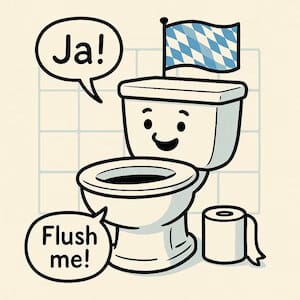
In Greece, even toilet paper has a story. Step into almost any bathroom and you’ll be greeted by a sign that seems both polite and threatening at the same time: “Μην ρίχνετε χαρτιά στην τουαλέτα.” Don’t throw paper in the toilet. They’re not joking.
The reason is simple: the σωλήνες (solínes – pipes) are tiny. Much of the country still relies on plumbing as narrow as a koulouri breadstick. Flush paper and the system revolts. One careless sheet and suddenly the entire neighborhood is calling the plumber, who arrives with a cigarette in one hand, a wrench in the other, and a lecture about “ξένοι” (foreigners) who think their toilet is an American freeway.
Instead, Greece offers an alternative: the little bathroom bin. At first it looks like any other bin, but soon you realize it’s not for tissues or empty shampoo bottles—it’s for the χαρτί (chartí – paper) you’d rather not think about. The first time a visitor encounters this, there’s a moment of cultural shock. You hesitate. You weigh your options. You stage an internal debate about hygiene, engineering, and civilization itself. And then, slowly, you accept. You join the Greek way. You drop the paper in the bin, close the lid, and move on with your day.
Hotels make this easier—they empty the bins daily with quiet efficiency. Locals are used to it; they empty theirs along with the kitchen trash, no drama. Eventually, you get used to it too. What once felt strange becomes as natural as ordering a φραπέ (frappé) at midnight.
Of course, this being Greece, there are exceptions. Some newer homes proudly announce that their pipes are “German,” wide and strong, capable of swallowing not just paper but perhaps the Iliad itself. Owners beam as they tell you: “Here you can flush, it’s OK.” They say it the way others brag about heated floors or a brand-new Mercedes. But even then, you hesitate. Old habits die hard, and no one wants to risk starring in the plumber’s next horror story.
Which brings me to my favorite exception of all. Our family doctor in Kalamata spent forty years practicing medicine in Germany before returning home with his wife. We love his office. Not just because he’s competent, kind, and punctual—rare qualities in local medicine—but because of the sign in his bathroom. In bold, glorious letters it reads: “Throw the paper in the toilet bowl.” After decades of German pipes, the man brought his plumbing standards with him. Every time I use his toilet, I feel like I’ve crossed the border into Bavaria without leaving Kalamata.

The cultural divide is fascinating. Tourists from the U.S. or northern Europe are the most bewildered. They arrive, see the bin, and cycle through the five stages of grief: denial, anger, bargaining, depression, and finally acceptance. Greeks returning from abroad go through their own mini-drama, forgetting the rules and then being scolded by Γιαγιά (Yiayia – grandma) when the pipes clog.
In the end, it’s not just about plumbing. It’s about adaptation. Greece teaches you that sometimes, even with modern life rushing around you, you need to slow down, follow the rules of an old system, and place things where they belong. Sunshine, olives, feta, and yes—even toilet paper has its own destiny here. In some places, it swirls away like Poseidon intended. In most, it waits politely in the little bin, preserving the fragile peace of Greek plumbing. And in one special doctor’s office in Kalamata, it flushes gloriously, with a Teutonic sense of pride.
¹ χαρτί (chartí) = paper, but in Greek, it can also mean “document.” So yes, even paperwork ends up in the bin.² σωλήνες (solínes) = pipes. Narrow, stubborn, and older than your cousin’s Fiat Panda.³ Greeks are masters of improvisation. They may not fix the pipes, but they will invent entire etiquette systems around them.
